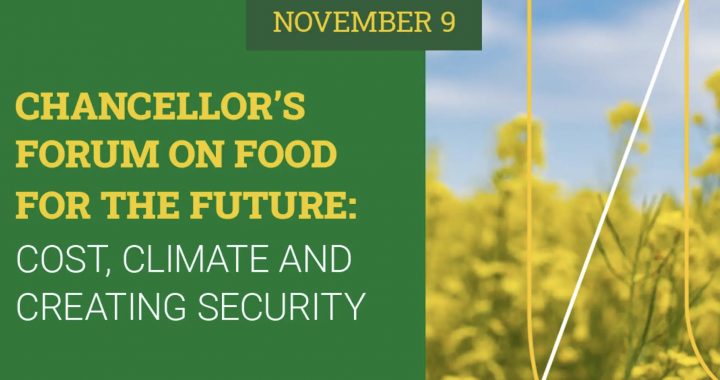On November 9, UAlberta hosted the 2022 edition: the Chancellor’s Forum on Food for the Future, where climate change, cost, and security were discussed in detail. The event brought together Isha Datar, executive director of New Harvest Research Institute dedicated to cellular agriculture; Alison Sunstrum, founder and CEO of CNSRV-X; and three faculty members from the Faculty of Agricultural, Life and Environmental Sciences: soil scientist William Shotyk, agricultural economist Ellen Goddard, and beef nutritionist Gleise da Silva. Goddard, Silva and Sunstrom are or have been regular Gentec collaborators.
Senator Paula Simons asked the experts “How do you think the events of the last two years have changed our perspective on the future of food and food security?”
From the beginning of COVID, everything was a shock to everybody. Most people had never imagined going to the grocery store, and not finding food. However, people are now more open-minded and tolerant of technology in food because they realize that food items aren’t going to appear on grocery store shelves in exactly the same format for the rest of their lives. So they are willing to try items they might have been a little bit more opposed to before. “I think trust in the people who create the products, trust in the people who are going to sell products, and trust in the government to regulate the products is very important.”
Alison and Gleise added that we still need to produce more; we know the population is growing; and we are losing space for agriculture. So we need to be more efficient and use less water and land, and try to implement technology agriculture to make sure everyone is fed. For instance, the investment of billions of dollars from hundreds of companies around the world show that growing food from cells is really important for our food system. Part of the plan going forward is: how can we grow more food in different ways? Growing meat from cells is one of those ways. According to Alison, the challenge of the future of food requires more than government funding to solve the problem; it will have to include everything from philanthropy to venture capital. However, academic funding is being squeezed all the time.
In response to what do we have to do to ensure we have healthy soil and water for our agricultural future, William mentioned that soil is the basis for 95% of our agricultural production but it is also important for forestry. Organic matter and soil help stabilize a global climate system.
“We have every possible mineral resource and fossil fuels and agricultural land and water resources. So we don’t have to think as much as other people do.”
The next question was “What are we going to be eating 50 years from now and what won’t we be eating?”
“I think for Christmas dinner, we’re probably going to eat the same food. I’m just not sure how or where it’s going to be created,” Ellen said. “But we will still want something that looks like turkey, mashed potatoes and gravy. But it will come from different origins.” Dr. Goddard also discussed the importance of consumer perceptions in food, and gave her insights on what we will have access to food-wise in 30 years.
William replied, “I grow quite a lot of my own food in my tiny backyard. When I look around Edmonton, I see a lot of space not being used, and I just think about how much food could be grown in the city.”
Gleise mentioned that we may have more food options but the most important thing is to eradicate hunger by increasing food distribution. According to Alison “What we eat in 50 years is completely dependent on the choices we make now. If we continue on the path that we have been on, I don’t know what our choices will be. Probably fewer options, more local food because of a lack of choice, and less access to animal products. However, if we make the right investment into diversifying our food system and creating more resilience, we should bounce back from changes in the supply chain, and have a wide diversity of food.
Our abundant natural resources in Canada and genomics offer a way to develop more resilient crops and livestock to help with the challenges facing us and discussed at the forum.
To watch a recording of the Chancellor’s Forum, click here
Niloofar Pejman
Visiting Scientist, Livestock Gentec

